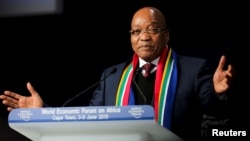This year's annual World Economic Forum on Africa, which took place in Cape Town, South Africa, focused on finding ways to ensure the continent's economic growth helps not only investors and business owners, but ordinary Africans as well.
For centuries, the African continent has been seen as an economic battlefield for its rich natural resources. But officials, investors and business leaders have tried for 25 years to change that mindset at the WEF.
Now, the WEF is focused on another goal - making sure that Africa's economic growth impacts hundreds of millions of Africans who struggle to survive in chronic, grinding poverty.
Business and government officials from the world’s largest economy, the United States, say this year’s conference has seen a growing awareness of the need for stable and sustainable growth that helps ordinary people as well as investors.
Elizabeth Littlefield is president and CEO of the Overseas Private Investment Corporation, a U.S. government organization that provides financing for private-sector projects. It focuses on initiatives that will lead to greater growth and development, like renewable energy, solar and wind power facilities, and natural gas projects.
“We are seeing more and more interest," said Littlefield. "And one challenge, one of the many challenges, but I would say one that we see on the horizon that I am quite interested in is, how do we make sure that economic growth, which is so powerful in so much of the continent, benefits all of Africans, lifts up livelihoods and improves lives of ordinary Africans, as well?"
But U.S. Trade and Development Agency Director Leocadia Zak says major challenges remain. One is the continent’s dire lack of good roads, electrical grids and other structures needed for strong economic growth. The World Bank estimates that Africa needs investments of at least $93 billion a year to fix these problems.
“One of the things that we have heard consistently throughout the past couple of days is that one of the biggest constraints to economic growth on the continent is the lack of infrastructure, and the need for infrastructure. And what we have also heard is that one of the constraints to the development to that infrastructure are well-prepared projects," Zak said.
Infrastructure development can be a tough sell for the profit-hungry investor crowd, as it takes time and massive resources.
But Daniella Ballou-Aares, the State Department senior advisor for development, says she is pleased to hear investors say they are more interested than ever in development projects.
“At the World Economic Forum in Africa, you have seen that the business community wants to be a part of this, as well. You are hearing both businesses and governments speaking about the importance of inclusive growth, a role that private investment can play in addressing energy challenges, agricultural challenges, the opportunity to increase the role of women in the economy, and the benefits for growth that that has," said Ballou-Aares.




